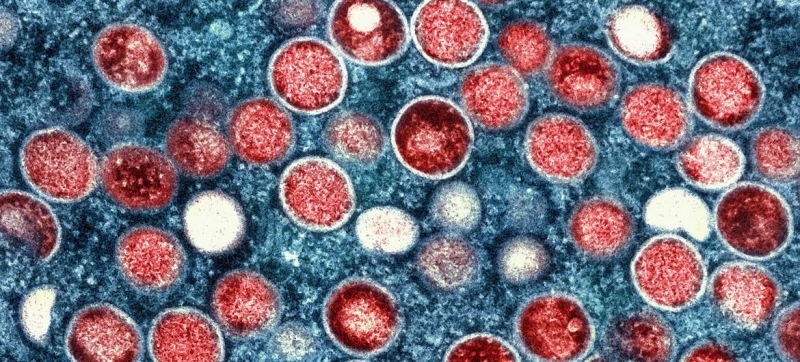
Monkeypox virus particles (red) inside an infected cell (blue). WHO sounds alarm over unprecedented rise in monkeypox cases in Africa Health
The World Health Organization (WHO) has raised its response to the monkeypox outbreak in more than a dozen African countries to its highest level yet, mobilizing an agency-wide response to the disease.
Since January, the African continent has seen what experts say is an unprecedented surge in monkeypox cases, with 15 countries reporting outbreaks. As of Thursday, 2,030 cases and 13 deaths had been confirmed so far this year, compared with 1,145 cases and seven deaths for all of 2023.
Monkeypox is a disease , caused by the monkeypox virus, which belongs to the genus Orthopoxvirus. Typical symptoms are a skin rash or lesions of the mucous membranes, which can last for two to four weeks and are accompanied by fever, headache, muscle and back pain, weakness and swollen lymph nodes.
People can become infected with monkeypox through physical contact with an infectious person, contaminated objects, or infected animals.
According to WHO, the largest number (90 percent) of reported cases are in the Democratic Republic of Congo, including a new variant that emerged last September. Cases of the variant have been reported in neighboring Rwanda and Uganda, as well as Kenya. Analysis of cases in Burundi is ongoing.
Matsidiso Moeti, WHO Regional Director for Africa, stressed that the priority at this stage is to immediately interrupt the spread of the virus. “We are working with humanitarian partners to strengthen outbreak response,” said Dr Moeti.
Working on the ground
WHO is working through country teams and expert teams deployed on the ground to support authorities in strengthening key areas of the response, including surveillance, diagnostic testing, clinical care and prevention.
The organization is also working with national health authorities to ensure access to therapeutics and to scale up public awareness efforts.
International risk assessment
WHO chief Tedros Adhanom Ghebreyesus convenes emergency a committee of experts to determine whether the outbreak in Africa constitutes an emergency of international concern. “The committee will meet as soon as possible and will include independent experts from a range of disciplines from around the world,” he said in Geneva.
